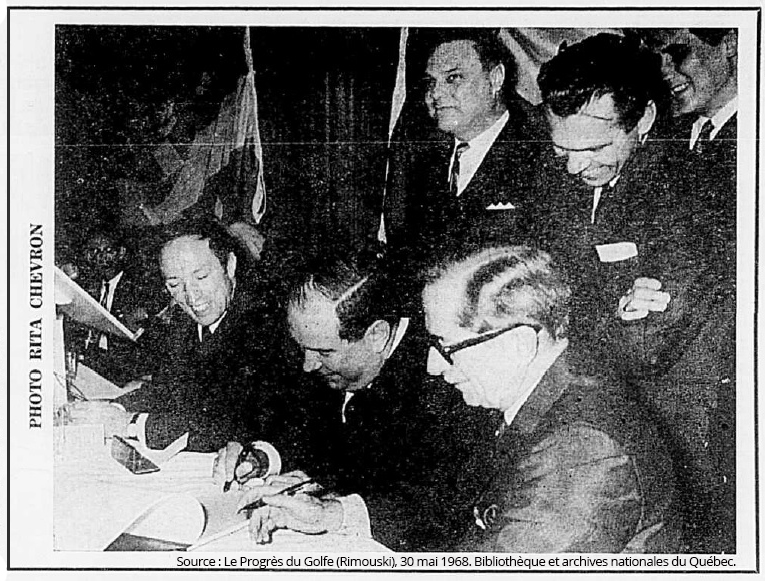History
It has already been 50 years since the Government of Canada began its regional economic development adventure in Quebec
For 50 years now, the Government of Canada has been actively participating in regional economic development in Quebec. And for the past 20 years, it has been contributing to business growth and regional vitality as the Economic Development Agency of Canada for the Regions of Quebec (CED).
Through its programs, initiatives and interventions and the presence of its 12 business offices in the field, CED is the key federal economic development player for the Quebec regions.
The first regional office

Rimouski was the starting point in 1968 of the federal government’s more tangible involvement, when the Department of Forestry and Rural Development brought in a federal administrator to implement the Eastern Quebec Development Plan.
In 1969, the Department of Regional Economic Expansion (DREE) was created and a liaison office opened in Québec, as was the case in all provincial capitals.
When DREE was decentralized in 1973–1974, four main economic regions were established: Western Canada, Ontario, Quebec, and Atlantic Canada. In Quebec, Montréal became the seat of the department’s first regional office. It also oversaw the Québec provincial office (responsible for Canada-Quebec agreements) and the Rimouski office.
Services extended to the regions
To better serve Quebec’s outlying regions, DREE opened offices in Val-d’Or and Alma in 1978, Sherbrooke in 1980, Trois-Rivières in 1981 and Drummondville in 1982. Then came the arrival of the Sept-Îles office in May 1987 following the creation of the Department of Regional Industrial Expansion (DRIE)—formed through a merger of DREE and the Department of Industry, Trade and Commerce—and the Office of the Federal Economic Development Co-ordinator.
With the signing of the Subsidiary Agreement on the Economic Development of the Regions and the abolition of DRIE in 1988, federal stakeholders in Quebec were reorganized to form the future Department of Industry, Science and Technology’s regional development office. It was also at this period that the Nord-du-Québec office was established in Montréal.
In 1991, the regional development office gained agency status and became the Federal Office of Regional Development – Quebec (FORD-Q). Under the aegis of this new body, the Outaouais office was established in Hull (Gatineau) in January 1993, followed by the Île-de-Montréal, Laval–Laurentides–Lanaudière and Montérégie offices in 1994. The division of the areas under the responsibility of each office will continue to evolve over the years.
CED: at the centre of regional development in Québec
In 1998, FORD-Q’s name was changed to the Economic Development Agency of Canada for the Regions of Quebec to better reflect the Government of Canada’s economic development mission in Quebec. The Gaspésie–Îles-de-la-Madeleine office, the newest of the Agency’s regional business offices, was opened in Gaspé in 2000.
With the entry into force of the Economic Development Agency of Canada for the Regions of Quebec Act on October 5, 2005, CED now has the legal status to promote the economic development and diversification of the regions of Quebec.
Since 2015, CED has been among the 17 federal departments and agencies in the Innovation, Science and Economic Development portfolio, whose mission is to foster a growing, competitive, knowledge-based Canadian economy.
These are just a few milestones that have shaped CED as it is today, with 50 years of support for the economic development of Quebec regions.
In May 2018, the Government of Canada is marking five decades of tangible service to local businesses and communities, while keeping its sights firmly set on the future.
| A half-century of achievements |
|---|
|
For 50 years now, the Government of Canada has been actively participating in regional economic development in Quebec. And for the past 20 years, it has been contributing to business growth and regional vitality as Canada Economic Development for Quebec Regions (CED). To highlight this milestone, CED published regional profiles that underscore its role as a catalyst for regional development over the decades. |